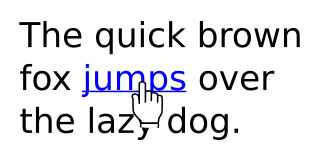Related Research Articles

Hypertext Markup Language (HTML) is the standard markup language for documents designed to be displayed in a web browser. It defines the content and structure of web content. It is often assisted by technologies such as Cascading Style Sheets (CSS) and scripting languages such as JavaScript.
PID or Pid may refer to:

The Semantic Web, sometimes known as Web 3.0, is an extension of the World Wide Web through standards set by the World Wide Web Consortium (W3C). The goal of the Semantic Web is to make Internet data machine-readable.

The World Wide Web is an information system that enables content sharing over the Internet through user-friendly ways meant to appeal to users beyond IT specialists and hobbyists. It allows documents and other web resources to be accessed over the Internet according to specific rules of the Hypertext Transfer Protocol (HTTP).

In computing, a hyperlink, or simply a link, is a digital reference to data that the user can follow or be guided to by clicking or tapping. A hyperlink points to a whole document or to a specific element within a document. Hypertext is text with hyperlinks. The text that is linked from is known as anchor text. A software system that is used for viewing and creating hypertext is a hypertext system, and to create a hyperlink is to hyperlink. A user following hyperlinks is said to navigate or browse the hypertext.

Have I Got News for You (HIGNFY) is a British television panel show, produced by Hat Trick Productions for the BBC, which premiered on 28 September 1990. The programme focuses on two teams, one usually captained by Ian Hislop and one by Paul Merton, each plus a guest panelist, answering questions on various news stories on the week prior to an episode's broadcast. However, the programme's format focuses more on the topical discussions on the subject of the news stories related to questions, and the satirical humour derived from these by the teams. This style of presentation had a profound impact on panel shows in British TV comedy, making it one of the genre's key standard-bearers.
Desert Island Discs is a radio programme broadcast on BBC Radio 4. It was first broadcast on the BBC Forces Programme on 29 January 1942.
An HTML element is a type of HTML document component, one of several types of HTML nodes. The first used version of HTML was written by Tim Berners-Lee in 1993 and there have since been many versions of HTML. The current de facto standard is governed by the industry group WHATWG and is known as the HTML Living Standard.

A digital object identifier (DOI) is a persistent identifier or handle used to uniquely identify various objects, standardized by the International Organization for Standardization (ISO). DOIs are an implementation of the Handle System; they also fit within the URI system. They are widely used to identify academic, professional, and government information, such as journal articles, research reports, data sets, and official publications.
Station identification is the practice of radio and television stations and networks identifying themselves on-air, typically by means of a call sign or brand name. This may be to satisfy requirements of licensing authorities, a form of branding, or a combination of both. As such, it is closely related to production logos, used in television and cinema alike.

BBC iPlayer is a video on demand service from the BBC. The service is available on a wide range of devices, including mobile phones and tablets, personal computers and smart televisions. iPlayer services delivered to UK-based viewers are free from commercial advertising. The terms BBC iPlayer, iPlayer, and BBC Media Player refer to various methods of viewing or listening to the same content. To use the service, a valid TV Licence is required by law.

Richard Kearton FZS, FRPS and Cherry Kearton, brothers, were a pair of British naturalists and some of the world's earliest wildlife photographers. They developed innovative methods to photograph animals in the wild and, in 1895, published the first natural history book to be entirely illustrated by wild photographs. Richard was made a Fellow of the Zoological Society of London and Royal Photographic Society. Cherry later became a wildlife and news filmmaker, and friend to Theodore Roosevelt. The Royal Geographical Society created the Cherry Kearton Medal and Award in his honour.

BBC Music is the arm of the BBC responsible for the music played across its services. The current director of music is Lorna Clarke.

The International Standard Name Identifier (ISNI) is an identifier system for uniquely identifying the public identities of contributors to media content such as books, television programmes, and newspaper articles. Such an identifier consists of 16 digits. It can optionally be displayed as divided into four blocks.

In computing, POST is a request method supported by HTTP used by the World Wide Web. By design, the POST request method requests that a web server accepts the data enclosed in the body of the request message, most likely for storing it. It is often used when uploading a file or when submitting a completed web form.

The ORCID is a nonproprietary alphanumeric code to uniquely identify authors and contributors of scholarly communication as well as ORCID's website and services to look up authors and their bibliographic output.
Attenborough: 60 Years in the Wild is a three-part BBC documentary series chronicling the 60 years career making wildlife programmes of Sir David Attenborough. The first hour-long programme, titled "Life on Camera" was broadcast on Friday 16 November 2012 on BBC Two at 9pm. The second part, "Understanding the Natural World" and third and final part, "Our Fragile Planet" were broadcast on following Fridays, 23 and 30 November 2012.

Ada Cherry Kearton was a South African classical soprano who sang in concert and oratorio. She made her London debut in 1907 and retired from the stage shortly before her marriage in 1922 to the English wildlife photographer Cherry Kearton. Her 1956 autobiography On Safari recounts their travels together in Africa, Australia and New Zealand.

The BBC Genome Project is an online searchable database of programme listings initially based upon the contents of the Radio Times from the first issue in 1923 to 2009. Television listings from post-2009 can be accessed via the BBC Programmes site.
References
- 1 2 Ferne, Tristan (18 August 2009). "BBC - Radio Labs: Machine tagging the BBC". BBC . Retrieved 15 July 2014.
- ↑ "BBC - Commissioning Radio - Glossary". BBC Online . Archived from the original on 22 February 2015. Retrieved 15 July 2014. – This source incorrectly expands the acronym as "Packet Identification number".
- ↑ "BBC Radio 4 - The Life Scientific - Available now". BBC Online . Retrieved 15 July 2014.
- ↑ "BBC Radio 4 - The Life Scientific, Zoe Shipton on fracking". BBC Online . Retrieved 15 July 2014.
- ↑ "Programme pages – www.bbc.co.uk/programmes" (PDF). BBC Academy. p. 4. Retrieved 17 October 2024.
- 1 2 "BBC Radio 4 - Desert Island Discs, Ada Cherry Kearton". BBC Online . Retrieved 16 July 2014.
- ↑ "BBC World Service - The World Today, 02/06/2008". BBC Online . Retrieved 16 July 2014.
- ↑ "BBC program identifier - Wikidata". Wikidata. Retrieved 15 July 2014.